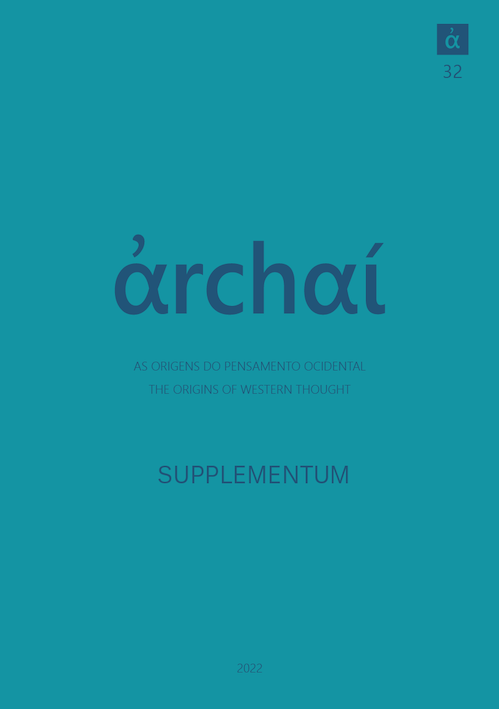The akin vs. the good in Plato’s Lysis
DOI:
https://doi.org/10.14195/1984-249X_32_39Keywords:
Plato, Lysis, friendship, friend, good, akin, desire, need, philosophyAbstract
The two most compelling accounts of the friend in Plato’s Lysis are that the neither good nor bad is friend of the good and that the akin is friend of the akin. In this paper I challenge a common interpretation that these accounts are the same, similar to, or compatible with one another. I argue instead that the two accounts are incompatible because they rely on opposing assumptions about the nature of desire and its relationship to need and about friendship and its orientation towards what benefits the one who loves. Although I do not offer a comprehensive interpretation of the dialogue, I argue that, given his main assumptions about the friendship, desire, and philosophy in the Lysis, Socrates could only endorse first of these accounts, that the neither good nor bad is a friend of the good, if indeed endorses any of them.
Downloads
References
ANNAS, J. (1979). Plato and Aristotle on Friendship and Altruism. Mind 86, p. 532-554.
BAYWATER, J. (ed.) (1894). Aristotlelis. Ethica Nicomachea Oxford, The Clarendon Press.
BOLOTIN, D. (1979). Plato’s Dialogue on Friendship: An Interpretation of the Lysis with a New Translation Ithaca, Cornell University Press.
BURNET, J. (1903). Platonis. Opera Oxford, Oxford University Press.
COOPER, J. M. (1997). Plato. The Complete Works Indianapolis, Hackett.
GADAMER, H.-G. (1980). Dialogue and Dialectic: Eight Hermeneutical Studies on Plato New Haven, Yale University Press.
GEIER, A. (2002). Plato’s Erotic Thought: The Tree of the Unknown Rochester, University of Rochester Press.
GONZALEZ, F. J. (1995). Plato’s Lysis: An Enactment of Philosophical Kinship. Ancient Philosophy 15, p. 69-90.
GONZALEZ, F. J. (2003). How to read a Platonic prologue: Lysis 203A-207D. In: MICHELINI, A. (ed.). Plato as author: The rhetoric of philosophy Leiden, Brill.
HYLAND, D. (1968). Eros, Epithumia, and Philia in Plato. Phronesis 13, p. 32-46.
NICHOLS, M. P. (2004). Friendship and Community in Plato’s Lysis The Review of Politics 68, p. 1-19.
RESHOTKO, N. (1997). Plato’s ‘Lysis’: A Socratic Treatise on Desire and Attraction. Apeiron 30, p. 1-18.
RUDEBUSCH, G. (2009). Socrates Oxford: Wiley-Blackwell.
RUDEBUSCH, G. (2004). True Love is Requited: The Argument of Lysis 221d-222a. Ancient Philosophy 24, p. 67-80.
PANGLE, L. S. (2006). Friendship and Human Neediness in Plato’s Lysis” Ancient Philosophy 21, p. 305-323.
PENNER, T.; ROWE, C. (2005). Plato. Plato’s Lysis. Cambridge, Cambridge University Press.
PRICE, A. W. (1989). Love and Friendship in Plato and Aristotle Oxford: The Clarendon Press.
SEDLEY, D. (1989). Is the “Lysis” a Dialogue of Definition? Phronesis 34, p. 107-108.
VERSENYI, L. (1975). Plato’s ‘Lysis.’ Phronesis 20, p. 185-198.
VLASTOS, G. (1973). Platonic Studies Princeton, Princeton University Press.
WOLFSDORF, D. (2007). Philia in Plato’s ‘Lysis.’ Harvard Studies in Classical Philology 103, p. 235-259.
Downloads
Published
How to Cite
Issue
Section
License
Copyright (c) 2023 David Jennings

This work is licensed under a Creative Commons Attribution 4.0 International License.
Given the public access policy of the journal, the use of the published texts is free, with the obligation of recognizing the original authorship and the first publication in this journal. The authors of the published contributions are entirely and exclusively responsible for their contents.
1. The authors authorize the publication of the article in this journal.
2. The authors guarantee that the contribution is original, and take full responsibility for its content in case of impugnation by third parties.
3. The authors guarantee that the contribution is not under evaluation in another journal.
4. The authors keep the copyright and convey to the journal the right of first publication, the work being licensed under a Creative Commons Attribution License-BY.
5. The authors are allowed and stimulated to publicize and distribute their work on-line after the publication in the journal.
6. The authors of the approved works authorize the journal to distribute their content, after publication, for reproduction in content indexes, virtual libraries and similars.
7. The editors reserve the right to make adjustments to the text and to adequate the article to the editorial rules of the journal.



